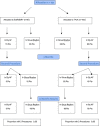Staged transthoracic approach to persistent atrial fibrillation (TOP-AF): study protocol for a randomized trial
- PMID: 24885377
- PMCID: PMC4066274
- DOI: 10.1186/1745-6215-15-190
Staged transthoracic approach to persistent atrial fibrillation (TOP-AF): study protocol for a randomized trial
Abstract
Background: Persistent atrial fibrillation frequently shows multiple different electrophysiological mechanisms of induction. This heterogeneity causes a low success rate of single procedures of ablation and a high incidence of recurrence. Surgical ablation through bilateral thoracotomy demonstrates better results after a single procedure. Prospective observational studies in inhomogeneous populations without control groups report a remarkable 90% of success with hybrid or staged procedures of surgical ablation coupled with catheter ablation. In this trial, we will examine the hypothesis that a staged approach involving initial minimally invasive surgical ablation of persistent atrial fibrillation, followed by a second percutaneous procedure in case of recurrence, has a higher success rate than repeated percutaneous procedures.
Methods/design: This is a controlled (2:1) randomized trial comparing use of a percutaneous catheter with minimally invasive transthoracic surgical ablation of persistent atrial fibrillation. The inclusion and exclusion criteria, definitions, and treatment protocols are those reported by the 2012 Expert Consensus Statement on catheter and surgical ablation of atrial fibrillation. Patients will be randomized to either percutaneous catheter (n = 100) or surgical (n = 50) ablation as the first procedure. After 3 months, they are re-evaluated, according to the same guidelines, and receive a second procedure if necessary. Crossover will be allowed and data analyzed on an "intention-to-treat" basis. Primary outcomes are the incidence of sinus rhythm at 6 and 12 months and the proportions of patients requiring a second procedure.
Discussion: The use of a staged strategy combining surgical and percutaneous approaches might be more favorable in treatment of persistent atrial fibrillation than the controversial single percutaneous ablation.
Trial registration: ISRCTN08035058 Reg 06.20.2013.
Similar articles
-
Sequential Hybrid CryoMaze Ablation versus Surgical CryoMaze Alone for the Treatment of Atrial Fibrillation (SurHyb): study protocol for a randomized controlled trial.Trials. 2016 Oct 24;17(1):518. doi: 10.1186/s13063-016-1634-4. Trials. 2016. PMID: 27776530 Free PMC article. Clinical Trial.
-
Current results of minimally invasive surgical ablation for isolated atrial fibrillation.Heart Rhythm. 2009 Dec;6(12 Suppl):S46-9. doi: 10.1016/j.hrthm.2009.08.020. Heart Rhythm. 2009. PMID: 19959143 Review.
-
Results of a minimally invasive surgical pulmonary vein isolation and ganglionic plexi ablation for atrial fibrillation: single-center experience with 12-month follow-up.Circ Arrhythm Electrophysiol. 2009 Aug;2(4):370-7. doi: 10.1161/CIRCEP.109.854828. Epub 2009 Jun 2. Circ Arrhythm Electrophysiol. 2009. PMID: 19808492 Clinical Trial.
-
Minimally Invasive Stand-Alone Cox Maze Procedure for Persistent and Long-Standing Persistent Atrial Fibrillation: Perioperative Safety and 5-Year Outcomes.Circ Arrhythm Electrophysiol. 2017 Nov;10(11):e005352. doi: 10.1161/CIRCEP.117.005352. Circ Arrhythm Electrophysiol. 2017. PMID: 29138143
-
Hybrid and surgical procedures for the treatment of persistent and longstanding persistent atrial fibrillation.Expert Rev Cardiovasc Ther. 2018 Feb;16(2):91-97. doi: 10.1080/14779072.2018.1425140. Epub 2018 Jan 12. Expert Rev Cardiovasc Ther. 2018. PMID: 29327638 Review.
Cited by
-
Minimally Invasive Atrial Fibrillation Surgery: Hybrid Approach.Methodist Debakey Cardiovasc J. 2016 Jan-Mar;12(1):37-40. doi: 10.14797/mdcj-12-1-37. Methodist Debakey Cardiovasc J. 2016. PMID: 27127561 Free PMC article. Review.
-
Sequential Hybrid CryoMaze Ablation versus Surgical CryoMaze Alone for the Treatment of Atrial Fibrillation (SurHyb): study protocol for a randomized controlled trial.Trials. 2016 Oct 24;17(1):518. doi: 10.1186/s13063-016-1634-4. Trials. 2016. PMID: 27776530 Free PMC article. Clinical Trial.
-
Catheter Ablation in the Treatment of Atrial Fibrillation.Int J Angiol. 2020 Jun;29(2):108-112. doi: 10.1055/s-0040-1708476. Epub 2020 Apr 28. Int J Angiol. 2020. PMID: 32499670 Free PMC article.
References
-
- Wann LS, Curtis AB, January CT, Ellenbogen KA, Lowe JE, Estes NA 3rd, Page RL, Ezekowitz MD, Slotwiner DJ, Jackman WM, Stevenson WG, Tracy CM. ACCF/AHA TASK FORCE MEMBERS, 2011 ACCF/AHA/HRS focused update on the management of patients with atrial fibrillation (updating the 2006 Guideline): a report of the American College of Cardiology Foundation/American Heart Association Task Force on Practice Guidelines. Heart Rhythm. 2011;8:157–176. doi: 10.1016/j.hrthm.2010.11.047. - DOI - PubMed
-
- Dixit S, Marchlinski FE, Lin D, Callans DJ, Bala R, Riley MP, Garcia FC, Hutchinson MD, Ratcliffe SJ, Cooper JM, Verdino RJ, Patel VV, Zado ES, Cash NR, Killian T, Tomson TT, Gerstenfeld EP. Randomized ablation strategies for the treatment of persistent atrial fibrillation: RASTA study. Circ Arrhythm Electrophysiol. 2012;5:287–294. doi: 10.1161/CIRCEP.111.966226. - DOI - PubMed
-
- Andrade JG, Macle L, Khairy P, Khaykin Y, Mantovan R, De Martino G, Chen J, Morillo CA, Novak P, Guerra PG, Nair G, Torrecilla EG, Verma A. Incidence and significance of early recurrences associated with different ablation strategies for AF: a STAR-AF substudy. J Cardiovasc Electrophysiol. 2012;23:1295–1301. doi: 10.1111/j.1540-8167.2012.02399.x. - DOI - PubMed
-
- Verma A, Mantovan R, Macle L, De Martino G, Chen J, Morillo CA, Novak P, Calzolari V, Guerra PG, Nair G, Torrecilla EG, Khaykin Y. Substrate and trigger ablation for reduction of atrial fibrillation (STAR AF): a randomized, multicentre, international trial. Eur Heart J. 2010;31:1344–1356. doi: 10.1093/eurheartj/ehq041. - DOI - PMC - PubMed
Publication types
MeSH terms
Substances
Associated data
LinkOut - more resources
Full Text Sources
Other Literature Sources
Medical


